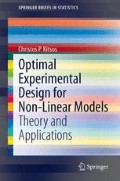Abstract
The Sequential Principle of design is adopted as the point estimation method and the theoretical insight is discussed, in a compact way. The Stochastic Approximation iterative scheme is discussed as a particular case.
Access this chapter
Tax calculation will be finalised at checkout
Purchases are for personal use only
References
Chaudhuri P, Mykland PA (1995) On efficient design on nonlinear experiments. Stat Sinica 5:421–440
Consonni G, Marin J-M (2007) Mean-field variational approximate Bayesian inference for latent variable model. Comput Statistics Data Anal 52:790–798
Ford I, Titterington DM, Wu CFJ (1985) Inference and sequential design. Biometrika 72:545–551
Ford I, Kitsos CP, Titterington DM (1989) Recent advances in nonlinear experimental design. Technometrics 31:49–60
Guttman L, Guttman R (1959) An illustration of the use of stochastic approximation. Biometrics 15:551–559
Hu I (1998) On sequential designs in nonlinear problems. Biometrika 85:496–503
Kitsos CP (1986) Design and inference in nonlinear problems. Ph.D. thesis, University of Glasgow, UK
Kitsos CP (1989) Fully sequential procedures in nonlinear design problems. Comp Stat Data Anal 8:13–19
Kitsos CP (1999) Optimal designs for estimating the percentiles of the risk in multistage models in carcinogenesis. Biometrical J 41:33–43
Lai TL, Robbins H (1981) Adaptive design and stochastic approximation. Ann Stat 7:1196–1221
Olin S, Farland W, Park C, Rhomberg L, Scheuplein R, Start T, Wilson J (1995) Low-dose extrapolation of cancer risks. ILSI Press, Washington, D.C
Robbins H, Monro S (1951) A stochastic approximation method. Ann Math Stat 22:400–407
Schervish JM (1995) Theory of statistics. Springer, New York
Titterington DM (1980) Aspects of optimal design in dynamic systems. Technometrics 22:287–299
Wosniok W, Kitsos CP, Watanabe K (1999) Statistical issues in the application of multistage and biologically based models. In: Cogliano VJ, Luebeck EG, Zapponi GA (eds) Perspectives on biologically based risk assessment (Chap. 7). Plenum Publishers, Berlin
Wu CFJ (1981) Asymptotic theory of nonlinear least squares estimates. Ann Stat 9:501–513
Wu CFJ (1985) Efficient sequential designs with binary data. JASA 80:974–984
Wu CFJ, Wynn HP (1978) The convergence of general step-length algorithms for regular optimum design criteria. Ann Stat 6:1273–1285
Author information
Authors and Affiliations
Corresponding author
Rights and permissions
Copyright information
© 2013 The Author(s)
About this chapter
Cite this chapter
Kitsos, C.P. (2013). Sequential Designs. In: Optimal Experimental Design for Non-Linear Models. SpringerBriefs in Statistics. Springer, Berlin, Heidelberg. https://doi.org/10.1007/978-3-642-45287-1_5
Download citation
DOI: https://doi.org/10.1007/978-3-642-45287-1_5
Published:
Publisher Name: Springer, Berlin, Heidelberg
Print ISBN: 978-3-642-45286-4
Online ISBN: 978-3-642-45287-1
eBook Packages: Mathematics and StatisticsMathematics and Statistics (R0)

